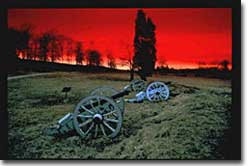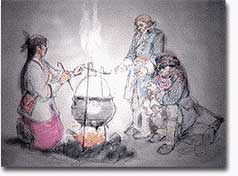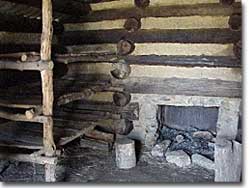What Did Washington Read His Troops in the Winter at Valley Forge

11f. Washington at Valley Forge

Cold, hunger, and sickness marked the Continental Army's stay at Valley Forge in Pennsylvania. Today, Valley Forge's broad fields are dotted with revolutionary relics, reminders of the brutal winter endured by Washington's troops.
American spirits reached a low point during the harsh winter of 1777-78.
British troops had marched triumphantly into Philadelphia the previous autumn. Philadelphia was the largest city in the Colonies and the seat of political power. Later on the British swept into Philadelphia, the Continental Congress had abscond to w, kickoff to Lancaster then to York.
Valley Forge
Washington'due south army had spent the summer of 1777 fighting a string of losing battles. The Americans harassed the British army in skirmishes and minor battles for much of the fighting season. In the autumn, the Americans showed pluck at the Battle of Brandywine in September and the Battle of Germantown in October. Notwithstanding the Americans were unable to keep the British out of Philadelphia.
In Dec, Washington marched his tired, browbeaten, hungry and sick ground forces to Valley Forge, a location about 20 miles northwest of British-occupied Philadelphia. From Valley Forge, Washington could go on an eye on General Howe's British ground forces ensconced in Philadelphia.

At Valley Forge, there were shortages of everything from food to clothing to medicine. Washington's men were sick from illness, hunger, and exposure. The Continental Army camped in rough log cabins and endured cold weather while the Redcoats warmed themselves in colonial homes. The patriots went hungry while the British soldiers ate well.
Terms of enlistment were ending for many soldiers in Washington's ground forces. The Full general wondered if he would even take an army left when the spring thaw finally arrived.
Washington under Siege

Peachy events generate great legends. Did an Oneida adult female named Polly Cooper, really ease the suffering of Washington and his troops at Valley Forge? Historians may never know for certain, merely the legend lives on.
General Washington was upset that local farmers were hoarding much-needed food waiting to earn higher profits in the spring. Some farmers even sneaked grain into Philadelphia to feed the British army, who paid in gold or silver. With each passing night came more desertions. Washington grew privately disgusted at the lack of delivery of his so-called patriot fighters.
Then there was the grumbling of some in Congress and among some of Washington's own officers. Washington's leadership skills were openly questioned. Many said Full general Horatio Gates was better-suited to leading the regular army. Later all, hadn't he scored a major victory in October at the battle of Saratoga.? Within the surround of cold, impecuniousness, and rebellion, how long could Washington and his army endure?
Weather condition at Valley Forge
Head Quarters, Valley Forge, Feb 16, 1778
Dear Sir: It is with great reluctance, I trouble y'all on a subject, which does not fall inside your province; merely it is a bailiwick that occasions me more than distress, than I have felt, since the offset of the war; and which loudly demands the most zealous exertions of every person of weight and authorisation, who is interested in the success of our diplomacy. I mean the present dreadful situation of the army for want of provisions, and the miserable prospects before usa, with respect to futurity. It is more alarming than you volition probably conceive, for, to form a simply idea, it were necessary to be on the spot. For some days past, there has been little less, than a dearth in camp. A part of the army has been a calendar week, without any kind of flesh, and the residuum for three or four days. Naked and starving as they are, nosotros cannot plenty admire the unequalled patience and fidelity of the soldiery, that they have not been ere this excited past their sufferings, to a general mutiny or dispersion. Strong symptoms, however, discontent take appeared in particular instances; and zero but the most acitive efforts every where tin long avoid so shocking a ending.
Our present sufferings are not all. There is no foundation laid for any acceptable relief hereafter. All the magazines provided in the States of New Jersey, Pensylvania, Delaware and Maryland, and all the immediate additional supplies they seem capable of affording, wil not exist sufficient to support the army more than a month longer, if so long. Very footling been done to the Eastward, and as fiddling to the South; and whatever nosotros have a correct to expect from those quarters, must necessarily be very remote; and is indeed more precarious, than could be wished. When the forementioned supplies are exhausted, what a terrible crisis must ensue, unless all the energy of the Continent is exerted to provide a timely remedy?
Impressed with this idea, I am, on my function, putting every engine to work, that I can possibly think of, to prevent the fatal consequences, we have and so bully a reason to apprehend. I am calling upon all those, whose stations and influence enable them to contribute their assistance upons and then important an occasion; and from your well known zeal, I expect every thing within the compass of your power, and that the abilities and resources of the state over which you preside, volition admit. I am sensible of the disadvantages it labours under, from having been then long the scene of war, and that it must be exceedingly drained by the great demands to which it has been bailiwick. But, tho' y'all may non be able to contribute materially to our relief, y'all can maybe do something towards it; and any assistance, nonetheless trifling in itself, will exist of cracking moment at then disquisitional a juncture, and will conduce to keeping the army together till the Commissary's section can be put upon a improve ground, and effectual measures concerted to secure a permanent and competent supply. What methods y'all can have, you will be the best judge of; simply, if you can devise any ways to procure a quantity of cattle, or other kind of flesh, for the use of this ground forces, to be at military camp in the course of a calendar month, you volition return a virtually essential service to the common cause. I accept the honor etc.
– George Washington, letter to George Clinton (Feb. 16, 1778)

These cabins may appear sturdy from the outside, but a closer look reveals their sparse and makeshift character. Imagine sleeping on one of those bunk beds.
Assist came in the form of a Prussian volunteer, Baron von Steuben. The military leader was aghast at the lack of American discipline. At Washington's urging he trained the Continental Ground forces, Prussian-style. The troops slowly became more professional. Among the soldiers who remained, confidence grew.
Over the grade of the winter, the weather improved somewhat. Food trickled in from the surrounding countryside. Many wives of soldiers spent time at Valley Forge over the winter. Washington was able to quash those who questioned his leadership abilities.
The Continental Army encamped at Valley Forge in the fall of 1777 with well-nigh 12,000 men in its ranks. Death claimed near a quarter of them before leap arrived. Another thousand didn't reenlist or deserted. Only the regular army that remained was stronger. They were fewer, but more disciplined. They were weary, but firmly resolved.
The adjacent year, 1778, brought greater fortune to the American crusade. While Washington froze at Valley Forge, Benjamin Franklin was busy securing the French alliance. Now the war would be different indeed.
Source: https://www.ushistory.org/us/11f.asp
0 Response to "What Did Washington Read His Troops in the Winter at Valley Forge"
Post a Comment